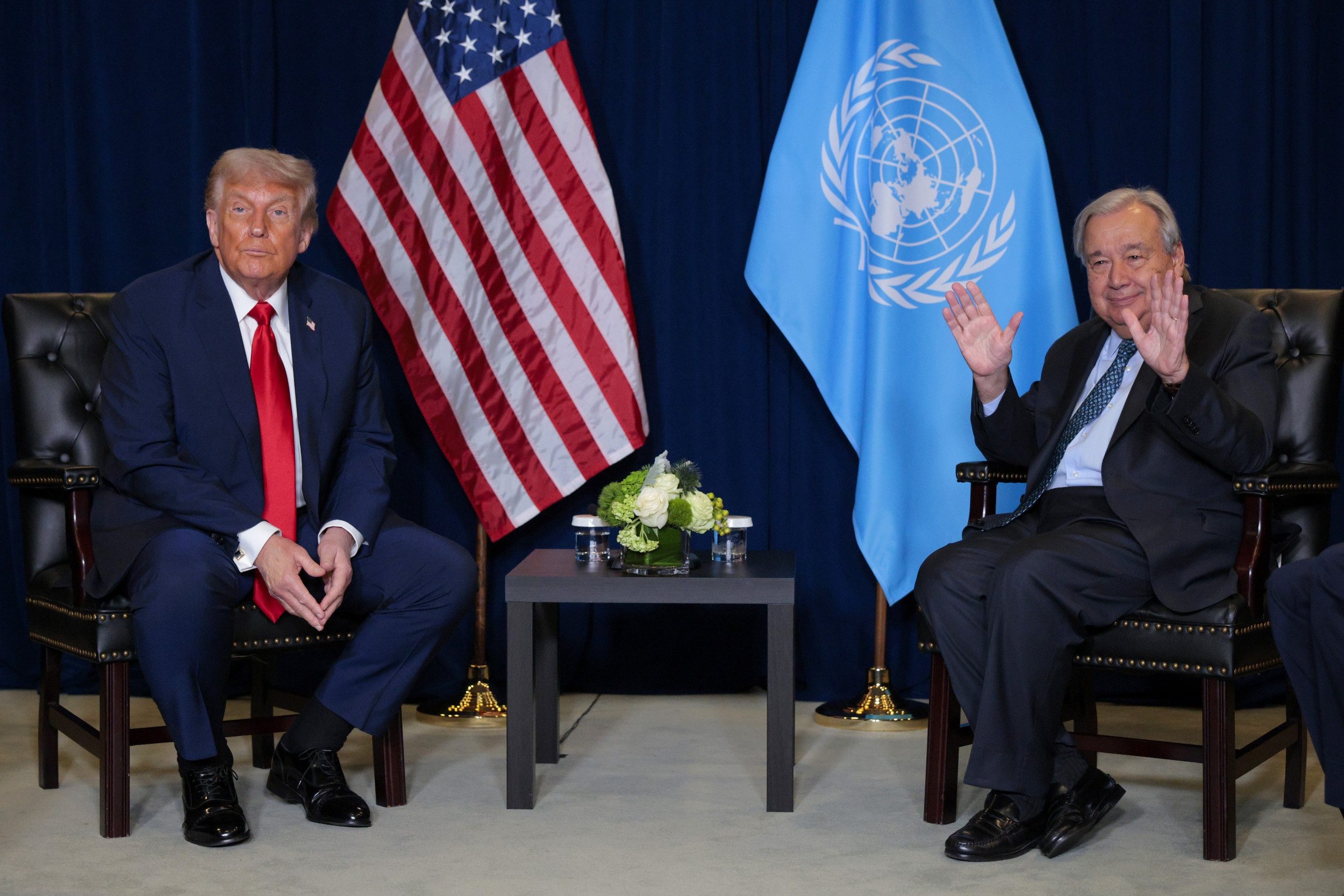
On Tuesday President Donald Trump stood before the United Nations General Assembly and called climate change “the greatest con job ever perpetrated on the world” as he defended his decision to pull the U.S. out of the Paris Climate Agreement.
The following day at the U.N. nearly 100 countries—including China, the world’s biggest climate polluter—outlined their commitments to new climate targets to cut emissions.
The back-to-back events at the U.N. during Climate Week NYC put in stark contrast the growing gulf between the U.S. and much of the rest of the world when it comes to climate and energy policy.
In his rambling, pugnacious and often factually incorrect speech, Trump mischaracterized earlier projections about climate change, insulted climate scientists and policy experts as “stupid people” and called renewable energy “a joke.” He falsely claimed that renewable energy is the “most expensive energy ever conceived,” when, according to his own Department of Energy, solar and onshore wind are most often the cheapest forms of new electricity generation.
Trump scolded nations that have adopted ambitious clean energy programs.
“I’m telling you that if you don’t get away from the green energy scam, your country is going to fail,” Trump said.
The Paris Agreement in 2025 hits a landmark 10 years, as nations prepare for the 30th Conference of Parties, or COP30, hosted by Brazil in November. Under the Paris Agreement countries are required to periodically update their plans to help the world stay below the most dangerous warming, and COP30 is the deadline for new national plans.
U.N. Secretary-General António Guterres hosted a high-level event on climate change on Wednesday for countries to highlight their updated plans and he extolled the rise of renewable energy.
“Clean energy is powering jobs, growth and sustainable development, generating the fastest and cheapest electricity, insulating economies from volatile fossil fuel markets, providing energy security and sovereignty and helping to deliver clean and affordable energy for all,” Guterres said.
The Trump administration is trying to persuade other countries to back away from climate objectives. Earlier this month, U.S. Energy Secretary Chris Wright visited Europe to encourage governments there to ditch clean energy and purchase more U.S.-produced oil and gas.
At a Climate Week NYC event Wednesday hosted by the New York Times Wright said that other countries should “absolutely” withdraw from the Paris Agreement, as the U.S. has under Trump. Wright argued that countries that embrace climate action have “become a club of people that have lost sight of the interests of their own people.”
At a summit on renewable energy last Monday morning in New York, Ursula von der Leyen, President of the European Commission, delivered her response.
“My message is, we are staying the course,” she said.
Von der Leyen described how European countries have responded to the energy crisis triggered when Russia cut off natural gas supplies to punish nations that supported Ukraine in its effort to repel Russia’s invasion.
“Our response to this energy crisis was not to retreat but to accelerate,” she said. “We massively invested in renewable energy.”
Three years later, she said, nearly half of Europe’s power comes from renewable sources, and solar and wind are the E.U.’s fastest growing energy, not only advancing climate goals but also enhancing energy security by reducing dependence on fossil fuel imports.
“Because the renewables are the most secure and affordable option in the long term, we knew this is homegrown energy, so, invest in it,” she said.
At the U.N. and at Climate Week events around New York it often seemed to be the U.S. against the world on climate and clean energy.
“Well, it’s not the U.S. against the world, there are also three other countries,” environmental economist Sir Andrew Steer told an audience at Newsweek’s “Powering Ahead” event on Thursday. Steer then wryly delivered his list of some of the other countries that have rejected the Paris Agreement: Yemen, Libya and Iran.
“So, it’s the company that you keep, isn’t it?” Steer said.
Steer’s storied career includes leading the World Resources Institute, serving as Special Envoy for Climate at the World Bank and helping to establish the Bezos Earth Fund. He currently holds professor positions at both the London School of Economics and Georgetown University.
Steer drew on his decades of experience on climate policy and economics to provide context for just how much the economics of climate action and clean energy have changed in that time.
“There used to be a view, which used to be correct, that it would be nice to act on climate change but it’s going to cost you,” Steer said. At about the time of the Rio Earth Summit that triggered the U.N. climate process in 1992, he said, the clean energy transition was an expensive proposition that involved tradeoffs between jobs and the environment.
“But the good news is, it’s not true anymore,” Steer said. “There’s a new economics that says, actually, taking bold, smart action on climate change will lead to more economic efficiency. It will drive new technology. It will lower risk. And it will reshape expectations about the future.”
Steer’s comments closed the day-long series of panel discussions that started with a conversation with American Clean Power Association CEO Jason Grumet.
Grumet argued that the Trump administration’s hostile policies toward clean energy, including blocking the completion of some wind projects, restricting access for renewable energy development on public land and removing federal loans and tax credits for clean tech manufacturers, will make it harder to meet rising energy demand.
“With demand soaring, we need every single electron that the country can bring to the public,” Grumet said. Electricity demand is on the rise due to electric vehicles, the electrification of more homes and manufacturing and the surging growth of AI data centers. “And yet we find ourselves in a situation where the government is basically betting against American companies and American industry.”
Government data shows that over the past two years the majority of new generating capacity brought online in the U.S. has been a mix of solar, wind and battery storage, the fastest and cheapest sources of power to build. Grumet pointed out that most independent analysts forecast a sharp rise in electricity prices due to Trump policies that limit or add costs to those sources.
“It’s an unsustainable position,” Grumet said. “It’s just a question of how much pain the public has to experience before the government realizes this is not in fact the way to go.”



